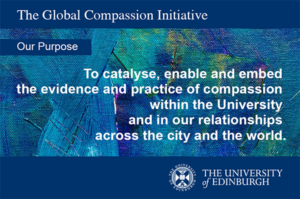What is a compassionate economy post-COVID-19, ask John Gillies, Liz Grant and Katherine Trebeck

Perhaps Adam Smith knew all along.
Compassion and economy are words which you rarely, if ever, see in the same sentence.
Yet none of us would be here without the love and compassion of our families when we were born and for years afterwards. Care for each other in the home is crucial to the functioning of the economy, but it is work that is not given value in GDP-focused assessments of the success of a nation. We, as co-directors on the University of Edinburgh’s Global Compassion Initiative and Katherine Trebeck, researcher on wellbeing and the economy, make a case here that the COVID-19 global emergency means that we have not just an opportunity, but an imperative to create a more compassionate and a more successful economy than that which was already damaging people and planet as COVID-19 descended.
Compassion
Archbishop Desmond Tutu defines compassion thus:
Compassion is not just feeling with someone, but seeking to change the situation if they are in pain, distress or suffering. Frequently people think compassion and love are merely sentimental. No! They are very demanding. If you are going to be compassionate, be prepared for action!
Compassion is now much in evidence around us as society organises to deal with the catastrophe of huge numbers of infections and deaths across the world. The pandemic has created huge new workloads for health and care staff, delivery drivers, shop workers and others, sometimes undertaken at great risk to themselves, as evidenced in the mounting numbers of COVID-19 deaths in these groups. Local community groups have responded to the pandemic by helping neighbours, vulnerable and elderly. GPs have rapidly changed their working practices and now see up to 90% of patients by video or telephone to protect patients and staff from infection. Hospitals have prioritised COVID care.
The Economy
We know that the economy in the UK and globally has taken an unprecedented hit and that life for us and future generations will be affected by the virus, with mass unemployment and the incomes being partially underwritten by Governments across the world. At the same time, we know that environmental breakdown, including climate change, is the biggest problem facing the human race and has not gone away when all eyes are on COVID-19. Climate change is a direct consequence of the way in which we have designed and run our global economic system. If we return quickly to the economic status quo, climate change will continue to accelerate and threaten the survival of many species, including the human one, within a few decades. But there is huge and perhaps understandable pressure, to do just that. Already we hear many calls for a return to normal, to get economies back on the road again and open for business. But a quick return to the status quo would see us step out of one frying pan into another.
It is worth instead stepping back to the 18th century for a counter to this. Adam Smith is often said to be the originator of ’devil tak’ the hindmost’ market economics, but this is a misjudgement. He did say in the Wealth of Nations:
it is not from the benevolence of the butcher, the brewer, the baker that we expect our dinner, but from their regard to their own self-interest.
However, nowhere does Smith say that the butcher is not, or should not be, benevolent as a person. His views on how trade should function within a society are well set out in the earlier Theory of Moral Sentiments, in which he states ‘how selfish soever man may be supposed, there are evidently some principles in his nature which interest him in the fortune of others, and render their happiness necessary to him.’ As Gordon Brown said in the Hugo Young Memorial lecture in 2005, ‘I have come to understand that the Wealth of Nations was underpinned by the Theory of Moral Sentiments, and that his invisible hand was dependent on the existence of a helping hand.’ And helping, we know, is often a compassionate action.
Smith’s approach to the economy is thus a direct predecessor of the concept of the Wellbeing Economy, in which humanity determines economics, not the other way round. Smith did not talk of growth but of ‘improvements’, and this should be how we think of the goal of economic policy beyond COVID-19. It is our task to ensure that a restored post-COVID-19 economy is an improvement on the old, that it allows us to return to meaningful work in a system that takes into account individual and planetary health, and thus addresses the challenges of intergenerational injustice, gross inequalities and catastrophic climate change. It must also address the spectre of mass unemployment, a significant post COVID-19 threat.
Sometimes, when people realise that they have to change, they will change. In our Universities now there is a huge focus on developing antibody tests, treatments and vaccines for COVID-19. These have been very quickly incentivised by Governments, industry and research funders, working often in concert.
However, we also need a focus on how incentives can help us better build a caring environment, which supports the many individual acts of kindness and compassion. The wellbeing economy approach (as championed by the Wellbeing Economy Alliance) to is to identify economic policies for a ‘great pause’, and then how to build back better. These represent a sensible—and compassionate—way out of here. Scotland’s membership of the Wellbeing Economy Governments (WEGo) since 2018 means that we have a head start.
We now need a strong parallel focus on economic research to identify how to create local, national and global economies for the future, both to avoid the secondary disaster of a great and long-lasting depression and to address the continuing challenges of climate change and persisting inequalities. Adam Smith would approve.
This article was originally published in COVID-19 Perspectives.
Authors
Professor John Gillies is Co-director, Global Compassion Initiative, Honorary Professor of General Practice, Usher Institute, University of Edinburgh. john.gillies@ed.ac.uk; @JohnGillies6
Professor Liz Grant is Co-director, Global Compassion Initiative, Director, Global Health Academy, Assistant Principal for Global Health, University of Edinburgh. @lizgrant360
Katherine Trebeck is a researcher and writer on wellbeing economy matters, including for Wellbeing Economy Alliance. She is co-author with Jeremy Williams of The Economics of Arrival: ideas for a grown-up economy. Policy Press, Bristol, UK. 2019. @KTrebeck
References
Adam Smith: what he thought and why it matters. Jesse Norman MP. Allen Lane, London, 2018.




